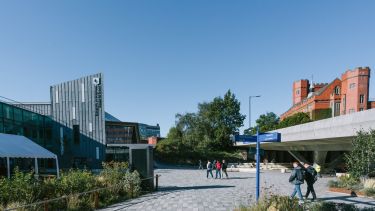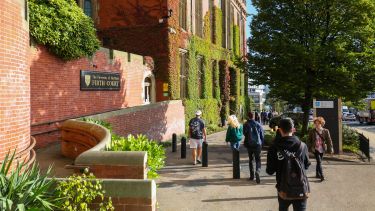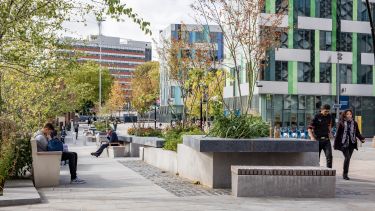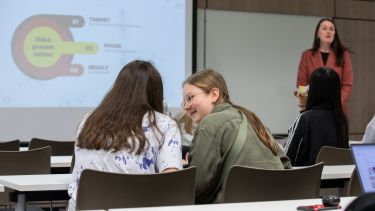- The University of Sheffield is continuing its commitment to supporting people who are fleeing war and persecution, with 10 refugee scholarships open for applications
- Refugee scholarships are part of the University’s Sanctuary initiative - a series of projects and schemes to help refugee students and scholars
- Sheffield’s Sanctuary initiative is seeing the University supporting people affected by war in their home country through scholarships, English language classes, training to help young refugees become future leaders of their communities, a twinning partnership with a university in Ukraine, placements for academics forced to flee and tailored one-to-one support for refugee and asylum seeker students
The University of Sheffield is continuing its commitment to supporting people who are fleeing war and persecution, with 10 refugee scholarships that are open for applications.
The Sanctuary Scholarships have been created to help students who have been displaced by conflict continue their studies. They cover the cost of tuition for each year of study and provide support with living costs.
The University has already helped 40 students through the programme since it launched and applications for the coming academic year are open.
Sheffield’s English Language Teaching Centre (ELTC) has also provided scholarships to help refugee students learn English - a key language in global higher education - and over the last year has supported students from Ukraine, Iraq, Syria, Afghanistan and Honduras.
Anna Fedotova, International and Community Officer at Sheffield Students’ Union, said: “I’m incredibly proud of the impact which the Sanctuary Scholarships have on the lives of those who have been displaced by conflict or forced migration. Those who are seeking sanctuary should have the opportunity to pursue their academic interests and to build their future lives. Our community in Sheffield is diverse and inclusive, and we are excited to welcome and support new academics and students who receive the scholarships.”
Sanctuary Scholarships are part of a number of initiatives at Sheffield to support people who have been displaced or affected by war or conflict in their home countries.
The University has formed a twinning partnership with a university in Kyiv to help their staff and students who are still in the Ukrainian capital. The aim of the partnership is to enable Ukrainian students and academics to continue their studies, as well as ensure their university survives the conflict so it can help the country rebuild once the war is over.
Since twinning with Igor Sikorsky Kyiv Polytechnic Institute (KPI), the University has donated £20,000 to help KPI rebuild its air raid shelter so the institution can remain open. Sheffield has given KPI students access to its online library facilities to support their education and Sheffield Students’ Union has joined up with KPI’s Students’ Union to lend its support and expertise. Academics from across the University of Sheffield have launched research projects with their Ukrainian counterparts, and Sheffield is donating high performance computers and lab equipment so KPI can continue its research activities.
Aside from the Ukrainian twinning partnership, the University has established a series of schemes to help people affected by wars and conflicts in other regions around the world, and to also help those who can’t or do not wish to flee.
Sheffield’s ELTC is working with the Rahela Trust charity on a project to deliver English lessons to women in Afghanistan.
The classes are delivered using mobile phones, including interactive self-study lessons and live one-to-one audio conversations with a tutor at Sheffield. Following the success of the course so far, the project is now looking at ways to help other women in the region.
The University has launched a Sanctuary International Visitors Support Scheme, which offers research placements to academics who have been displaced or affected by war or conflict. This provides funding for academics to continue their research in Sheffield for up to 12 months. Since the scheme launched, academics from Ukraine, Iran, Nigeria and Turkey have been offered placements and will have joined Sheffield by July 2023.
Sheffield also supports the Council for At-Risk Academics in its work in providing urgently-needed help to academics in immediate danger, those forced into exile, and the many who choose to work in their home countries despite serious risks.
Professor Koen Lamberts, President and Vice-Chancellor of the University of Sheffield, said: “The University was founded to help the people of Sheffield and this mission remains at the heart of our institution. However, we have also grown to become a global university, so we want to do what we can to help those who are in need around the world.
“Through our sanctuary work, the University is helping people who are fleeing war and persecution across the globe. Education and research are at the core of what we do, so we are using these to try and make a difference to those affected by these terrible events.
“We are committed to supporting refugee students and scholars and will continue to look at what else we can do to help those in need.”
The University’s home city of Sheffield has a long history of welcoming refugees. Sheffield was the UK’s first City of Sanctuary in 2007 and recently people in the city have been opening up their homes to refugees fleeing the war in Ukraine.
The University of Sheffield collaborates with partners from across the city to help those in need, through projects such as its work with Student Action for Refugees Sheffield (STAR) to set up computer accounts for local asylum seekers and refugees, so they can access the wireless internet network across the University. Asylum seekers and refugees can also access the University’s library resources and online English language support materials for free.
The University also recently ran a Young Changemakers project to help displaced young people in South Yorkshire become future leaders of their communities.
Supported by experts in business and finance from the University’s Management School, the initiative saw teenage refugees work together in teams to create their own ideas on how the city of Sheffield can reach one of the United Nations’ Sustainable Development Goals. The programme ended with a mock UN meeting where each team presented a summary of their recommendations to Sheffield City Council.
The winning proposal was developed by Yuliia Borzenok and Anastasiia Zviahina, two teenagers from Ukraine who have sought sanctuary in Sheffield under the Homes for Ukraine scheme. They developed a proposal for how to better integrate foreign teenagers in UK society.
As new arrivals themselves, the girls had an idea to set up an education programme to help refugee teenagers. Their programme would consist of a set of lectures on topics such as behaviour in and outside of school, cultural orientation and planning their future education and careers. The youngsters also conducted a survey of teenagers who have been forced to flee from other countries to demonstrate interest in such a programme.
The University is also supporting Migration Matters Festival - a nine day celebration of diversity and the contributions migrants make to our society and Sheffield - to deliver a strand of events on the issues of migration, immigration and culture.
Contact
For further information please contact:








